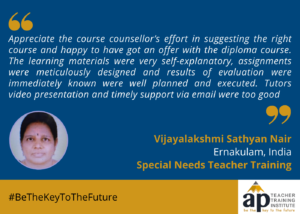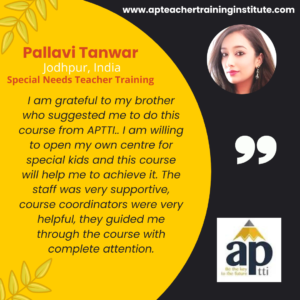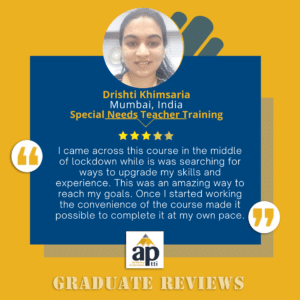Essential Skills for Special Educational Needs Teachers
SEN Certificate holders must possess various skills and competencies that support students with Special Educational Needs. In this blog, we’ll explore the essential skills that every special educational needs teacher should possess. These skills & qualities include empathy, communication, patience, and adaptability. Browse till the end to discover how these qualities can help SEN teachers create a positive learning environment for their students.
What are the essential skills required to become a successful special educational needs teacher?
Orderliness
Both the teacher and the classroom should possess a sense of orderliness. When a learning environment is well-organized, it promotes a strong desire in students to learn and boosts their confidence.
Innovation
Educators should cultivate innovative teaching approaches to accommodate the diverse learning preferences of their students. They can consider joining a teacher training institute to develop these innovative teaching techniques.
Highly perceptive
Teachers need to have a high level of perceptiveness to grasp the subtleties of their student’s behaviour. This will aid in gaining a better understanding of their students’ issues and provide quick and effective solutions.
Peaceful Nature
Teachers need to exhibit a peaceful nature and establish a positive classroom atmosphere to support students who may feel overwhelmed by academic stress. This is something that heads or is the very first thing that is taught in teacher training course by several institutions.
Meticulous
Teachers should be meticulous in their observation skills. This will aid in gaining a better understanding of their student’s behaviour and facilitate their development.
Time-conscious
Teachers should coach their students to adhere to timelines and meet their objectives promptly, promoting a sense of accomplishment and satisfaction.
Flexibility
Teachers need to be adaptable to their students’ evolving needs and behaviours, enabling them to adjust their teaching methods accordingly and keep them current.
Calm and composed
Teachers should be calm and composed with all their students, creating a welcoming and approachable learning environment.
Sense of humour
Teachers should have a sense of humour that can make their classes enjoyable and create a
positive classroom atmosphere, encouraging students to look forward to coming back to school.
Genuine affection for children
Teachers should possess a sincere passion for imparting knowledge to their students, allowing them to reach their full potential and succeed.
What training and qualifications are necessary for special educational needs teacher?
Individuals who hold an M.Ed. in special education are qualified to instruct college-level students with special needs. The minimum educational requirement for becoming a special education teacher is a two-year Master’s degree in Special Education after completing a B.Ed. in Special Education. Aspiring teachers can pursue a Master of Education (M.Ed.) program designed to enhance their classroom teaching skills.
What personal qualities are important for a special needs teacher?
Flexibility
Classroom environments can be volatile, so teachers must exhibit adaptability and uphold professional standards in any circumstance.
Cooperation
Establishing cooperative relationships with other teachers, administrators, parents, and community agencies is crucial in creating a supportive and conducive learning environment.
Communication skills
Teachers advocate for their students by effectively communicating their needs and seeking resources to enable them to achieve their full potential.
Empathy
Students with special needs can be reached on multiple levels when educators show empathy and demonstrate love and respect towards them. By teaching students to appreciate themselves and to learn more about their disabilities, teachers can foster an environment of growth and progress.
Commitment to growth
Teachers must continuously pursue professional development and learning opportunities to be role models for their students and communities. This unwavering commitment to growth allows teachers to stay current and provide the best possible education for their students.
Evaluation abilities
Special education teachers play a crucial role in determining their students’ strengths and areas for improvement. They must possess excellent evaluation skills to conduct assessments and develop individualized plans catering to each student’s needs. These plans must be regularly
reviewed and updated to ensure the student’s continued progress.
Familiarity with Educational Theory and Practice
Understanding human development, learning theories, and professional knowledge is crucial for developing effective educational programs for children with special needs. It provides a strong foundation for learning and ensures that students receive the appropriate support and resources they need to succeed.
Active Listening
Active listening skills are essential for great teachers to become confidantes, mentors, and advocates for their students. When students know their perspectives are being heard and valued, their confidence and self-esteem increase.
Systematic approach
A systematic approach to classroom management, including effective planning and organization, helps create an environment where students can thrive and learn effectively. It is the cornerstone of a successful learning experience.
Endurance
Teaching students with special needs can be challenging, but the teacher must remain patient and persistent to ensure the students receive the best possible education. This quality is essential for special education teachers who work
with students who may require more time and attention to understand concepts and skills.
Tenacity
Special education teachers must have the tenacity to persist in the face of challenges and setbacks to model this trait for their students and help them develop their resilience.
Professionalism
Being professional means that educators must maintain a high standard of ethics and expertise in their work, essential to building trust and respect from their students, parents, colleagues, and the community.
Reliability
Building and maintaining trust with students and parents through consistent, confidential communication is crucial for special education teachers to establish effective relationships and foster student success.
What challenges do special educational needs teachers face, and how can they develop the skills to overcome them?
- The Challenge of Dispelling the Misperception That Teaching is Easy
- Balancing Non-Instructional Responsibilities With Teaching Duties
- Coping with a Lack of Support in Special Education
- Managing the Complexity of Multiple Disabilities in the Classroom
- Coping with Death and Grief in a Special Education Setting
- Overcoming the Challenges of Inclusion in the Classroom
- Dealing with Professional Isolation as a Special Education Teacher
- Working with Parents Who Lack Support for Their Child’s Special Needs
- Navigating the Difficulty of Discipline in a Special Needs Classroom
- Overcoming Budget Constraints and Resource Shortages in Special Education
What strategies special educational needs teachers needs to develop and maintain their skills and competencies over time?
- Show, Demonstrate, and Model
- Multisensory Learning Techniques
- Breaking Down Information into Smaller Units
- Peer Tutoring and Cooperative Learning
- Developmentally Appropriate Approach
- Using Concrete Examples
- Small Group Instruction
Conclusion
Special Educational Needs teaching is a challenging and rewarding profession requiring unique skills and competencies. The ability to empathize with students, communicate effectively, and adapt to different learning styles is required for the success of a special needs teacher. This is because these qualities help Special Educational Needs teachers to create a safe and supportive learning environment for their students. So if you’re interested in pursuing a career in SEN teaching, consider enrolling in an online teacher training program to develop these skills further. Thank you for browsing till the end, and remember to check out the full blog for more insights and tips!








